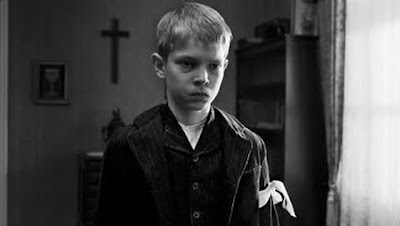I'll make this one relatively brief, mostly because it's so hard to know where to begin. Watching Haneke's films I always feel like I'm being taunted by a being whose intelligence is far greater than my own. His films are incredibly open ended, leaving some viewers claiming that there are no answers, while some claim with positivity that they know just what he was aiming for (check out the imdb boards). To me, Haneke is brilliant. He's the only director I can think of who is a master of visually storytelling, yet manages to make a movie, purposefully eliminating what other filmmakers would consider key scenes, only to have the film turn out better for it. In the White Ribbon, there is a masterful play of show and tell. Haneke makes choices that might be completely wrong in the hands of someone less capable.
Haneke manages to straddle some elusive barrier between subtlety of message and overtness. I mean, it's a morality play shot in high contrast black and white; that's pretty blatant metaphor. Also, it deals with the oppressed children in a German rural township who will grow up to be the Nazi generation. Yet, there's a profound deepness to his work, and i think it somehow hearkens back to what he chooses to show and what he doesn't. He doesn't condescend to his audience by handing them the answers on a platter. His films reflect a world where there are no easy answers.The movie depicts a period of time, about a year in length, in which a serious of increasingly violent crimes are committed. Almost every single one happens off screen; we only see some of the aftermath--a body, a boy crying. Rather than cutting within the scene, Haneke tends to position the camera, then having his subjects walk in and out of the frame. Once in a while he will pivot the camera to follow them, but the camera remains stationary. He uses this method in the powerful scene depicting the punishment of two of the priest's children. They enter a room at the end of the hall, closing the door behind them. The camera rests, statically, and gradually we hear the sounds of whipping issuing from behind it. It has been said of Haneke that he likes to test the modern audience and its desire to witness violence acts; therefore, he deprives them of that pleasure. Here, denying us access makes the punishment even more shaming. The rest of the missing scenes work in a different way, because we are able to imagine any number of people executing the crimes. And forcing the audience to use their imagination in this way, makes even us possible perpetrators.
 In another scene, the school teacher (Christian Friedel) witnesses one of these children, balancing tenuously on the railing of a bridge. The teacher anxiously yells for him to come down; the child claims, inscrutably, that he gave God a chance to punish him, but God didn't take the chance, so he must want him to live. Likening his parents, the highest authority he knows, to God, creates the oppressive state of ignominy leading to his and the other childrens' sociopathy. Throughout the film, we bear witness to the adults' hypocrisy. Their adulterous and incestuous crimes go unpunished, while the children are tied to their beds to prevent masturbation, or beaten for staying out too late (although what we are meant to assume they are doing might be deserving of such a punishment, or worse).
In another scene, the school teacher (Christian Friedel) witnesses one of these children, balancing tenuously on the railing of a bridge. The teacher anxiously yells for him to come down; the child claims, inscrutably, that he gave God a chance to punish him, but God didn't take the chance, so he must want him to live. Likening his parents, the highest authority he knows, to God, creates the oppressive state of ignominy leading to his and the other childrens' sociopathy. Throughout the film, we bear witness to the adults' hypocrisy. Their adulterous and incestuous crimes go unpunished, while the children are tied to their beds to prevent masturbation, or beaten for staying out too late (although what we are meant to assume they are doing might be deserving of such a punishment, or worse).Did the children commit these crimes? Probably, yes. But Haneke, as he has done in the past, implicates everyone in these violent occurrences. Directly or indirectly, nearly everyone is responsible.
(image the first)
(image the second)
(image the third)



agreed, i like it more when you take your own screen captures, but it looks like you couldn't really go wrong with choosing them for this film anyway. niceeeee
ReplyDeleteSaw this the other night. Really chilling. Much prefer this to Cache where I thought Haneke was trying to have it both ways with that ludicrous scene at the end
ReplyDelete